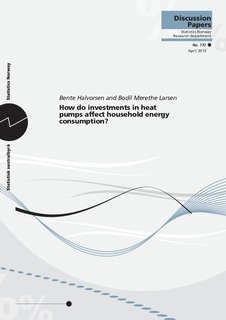How do investments in heat pumps affect household energy consumption?
| dc.contributor.author | Halvorsen, Bente | |
| dc.contributor.author | Larsen, Bodil Merethe | |
| dc.coverage.spatial | Norway | nb_NO |
| dc.date.accessioned | 2019-11-12T13:14:47Z | |
| dc.date.available | 2019-11-12T13:14:47Z | |
| dc.date.issued | 2013-04 | |
| dc.identifier.issn | 0809-733X | |
| dc.identifier.uri | http://hdl.handle.net/11250/2627970 | |
| dc.description.abstract | Increased energy efficiency is often seen as the best way of reducing energy consumption. However, the cost reduction resulting from the efficiency increase can undermine the energy-saving potential of the efficiency measures. In this study, we develop a method for decomposing the behavioral responses to increased energy efficiency based on a conditional demand model applied to a household production framework. We find that the electricity savings potential of the increased use of heat pumps in Norwegian homes is completely offset by changes in consumption. Households with heat pumps maintain higher indoor temperatures, consume less alternative fuels and engage less in energy-saving behavior than other households. This analysis illustrates that subsidizing investments in new and more energy-efficient technology may not always be an effective means of reducing energy consumption. | nb_NO |
| dc.description.sponsorship | Research Council of Norway (Renergi) | nb_NO |
| dc.language.iso | eng | nb_NO |
| dc.publisher | Statistisk sentralbyrå | nb_NO |
| dc.relation.ispartofseries | Discussion papers;737 | |
| dc.subject | JEL classification: C31 | nb_NO |
| dc.subject | JEL classification: C34 | nb_NO |
| dc.subject | JEL classification: D12 | nb_NO |
| dc.subject | JEL classification: D13 | nb_NO |
| dc.subject | JEL classification: Q41 | nb_NO |
| dc.title | How do investments in heat pumps affect household energy consumption? | nb_NO |
| dc.type | Working paper | nb_NO |
| dc.description.version | publishedVersion | nb_NO |
| dc.subject.nsi | VDP::Matematikk og Naturvitenskap: 400::Matematikk: 410::Statistikk: 412 | nb_NO |
| dc.source.pagenumber | 26 | nb_NO |
Tilhørende fil(er)
Denne innførselen finnes i følgende samling(er)
-
Discussion Papers [1003]
